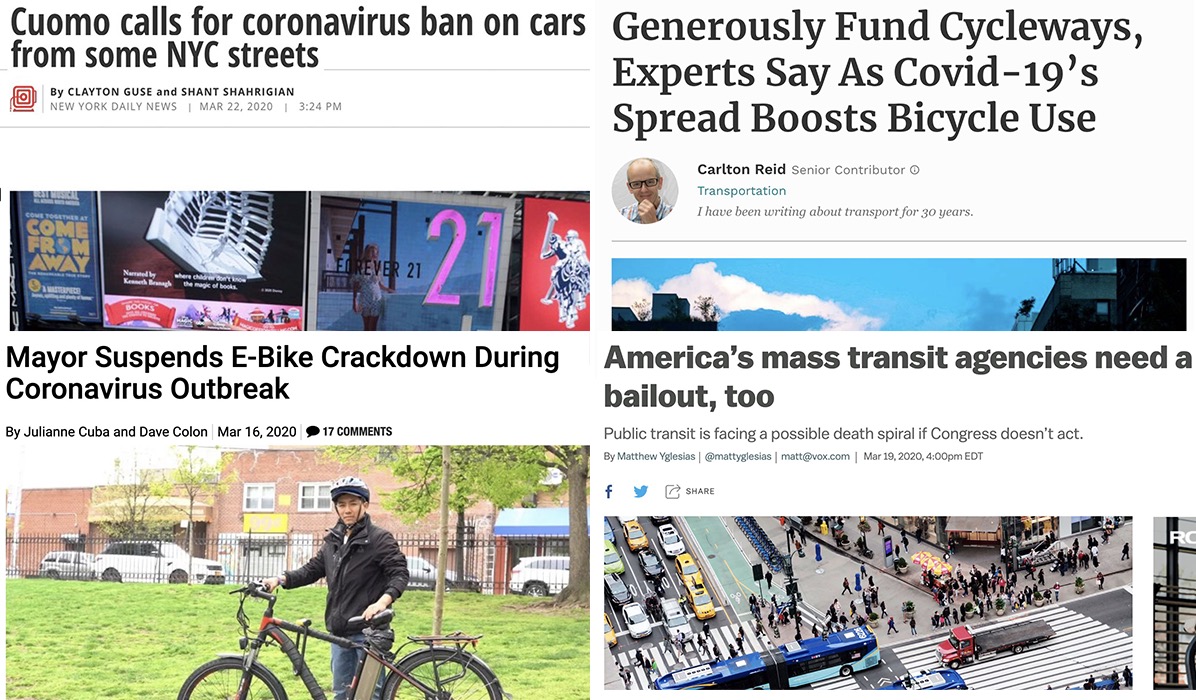
Welcome to the week. Here are the most noteworthy items BikePortland editors and readers came across in the past seven days…
Another bike boom? Bicycle industry veteran Heather Mason says the amount of people dusting off bikes amid the pandemic could lead to a renaissance of cycling in America and that bike businesses should seize the opportunity.
Boom-ready cities: Cities around the world are looking to make bicycling safer and easier as virus fears keep people off transit and public health officials say pedaling is a great way to deal with quarantine fatigue.
Clarity amid crisis: Pretty sad that it took a severe virus outbreak for New York City leadership to realize their crackdown on e-bikes was a bad idea and that the delivery people who ride them are so vital.
Cargo bikes FTW: With a boom in delivery, urban businesses across the country are turning to cargo bikes to meet demand. One rider for Whole Foods in New York City says he’s making $25 an hour with tips.
Sparing the air: People are freaking out about how clean the air is in usually smog-choked Los Angeles.
Advertisement
More social distance on streets: New York Governor Andrew Cuomo and NYC Mayor Bill De Blasio think it makes sense to re-allocate street space away from car users to give more room for people walking, rolling and riding bikes.
Tough for transit: Without a government bailout, transit agencies could be hurt long-term given the drastic falloff in ridership. Portland’s TriMet is still running, but The Oregonian says that could change.
Stop expanding highways and parking lots: One Portland transportation reform activists thinks if we have to make a choice between funding transit or wider freeways and new parking garages, “transit should win, hands down.”
Stay ready: If you’re bummed that the race you’ve been training for has been postponed, check out these excellent tips on how to stay ready from expert author and cycling coach Joe Friel.
Bibs to masks: Italian bike apparel maker Santini is one of the growing list of companies that plans to shift production to medical masks.
Congratulations. You’re all caught up!
— Jonathan Maus: (503) 706-8804, @jonathan_maus on Twitter and jonathan@bikeportland.org
— Get our headlines delivered to your inbox.
— Support this independent community media outlet with a one-time contribution or monthly subscription.



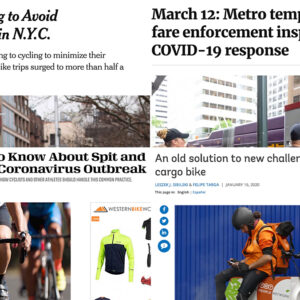
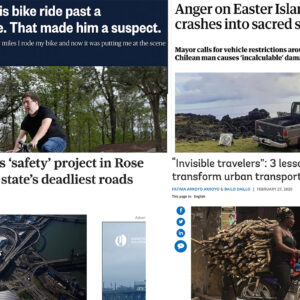
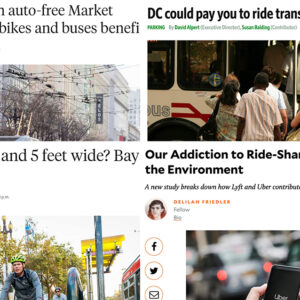
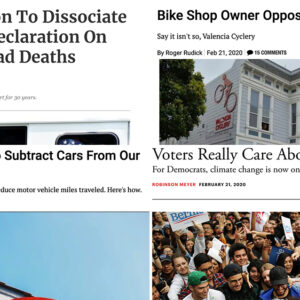
Thanks for reading.
BikePortland has served this community with independent community journalism since 2005. We rely on subscriptions from readers like you to survive. Your financial support is vital in keeping this valuable resource alive and well.
Please subscribe today to strengthen and expand our work.
Way too early to predict how we will ‘rebound’ from the virus. Americans have very short historical memories and tend to go back to their old ways in just a few years. We are creatures of habit. If I were in the bike industry, I would not be investing large sums of money anticipating a new boom.
I would bet on a new bike boom. What Americans want, and what they will be able to have are two different things, especially during and after the coronavirus. Two things are almost a certainty. First, many people will be much poorer and unable to afford cars after the economic wallop of this period, and during the long slow climb out of it. Second, the tight oil industry ( which provides more than half of our domestic oil) will go bankrupt and shut down from the low prices driven by low demand, and then when demand does come back it will be dead and then supply will come up short. Welcome gas rationing America. A few weeks ago people would laugh at such a thing happening but now that the normalcy bias has been cleared away we can see such a thing is truly possible. Lets focus on keeping our transit alive, dust off those bikes in the garage, and support your local bike builder as they will be the new gods when this is over.
I agree with some of your short-term predictions. A lot of people will be poorer, and might even lose their motor vehicles to repossession. This will depend on how much forgiveness the financing industry is forced to, or chooses to grant. Longer term, it will depend on the speed and depth of the recovery. If we are back to pre-virus economic levels within six months, I think that the effect will be minimal. Thinking about it, e-bikes will be a good bet, because many new cyclists will be non-athletes and would love to twist the throttle. If I had capital, I might buy up a bunch of used e-bikes.
at Cycle Portland we just listed all our rental electric bikes for sale on craigslist yesterday. https://portland.craigslist.org/mlt/bik/d/portland-raleigh-electric-bikes/7097368733.html
great time to pick up a new E-whip.
Saudi Arabia has lately been doing a lot to put an end to tight oil production in this country, too. your prediction seems at least plausible.
on the other hand, I could see the federal government inventing a whole bunch of new money to keep struggling oil companies afloat to avoid another oil crisis.
It is clear that Saudi Arabia is undertaking a clearheaded plan to crush the oil production in competing nations, and they may well succeed. But this plan will only work if sufficient oil keeps flowing to keep prices at a level that other oil production won’t start back up, and also that we don’t switch to alternatives (which exist now, but didn’t in the past).
Barring external shocks, I think we’re likely to be looking at an era of cheap, Saudi-produced oil.
The problem is that the Saudi’s no longer have the ability to produce nearly unlimited amounts of oil at cheap prices as they did in the 1990’s. Their supergiant fields are all in decline with an alarmingly high water cut ( See Matt Simmons book “Twilight in the Desert”. ) They have squandered much of their wealth on a brutal war with Yemen that seems to be turning in the Yemeni’s favor. They current member of the clan in power, MBS, is under threat from other members of the family and the rest of the domestic situation is growing restless. The Saudi’s actually went to the Russians ( now the worlds largest producers) in January and begged them to join an Opec production cut to prop up oil prices in the face of slumping demand due to Covid-19. Putin said Nyet, and the Saudi’s had no choice but to pump as much as they could to maximize revenue. The shale oil business will be done and dusted before prices go back up high enough to rescue them. They have such steep depletion curves that only a year or so without aggressive drilling and fracking ( big investments) of wells and volume will drop off the charts.
To make matters worse, the decision makers in Washington have now realized that killing Soleimani was a giant mistake that has enraged most of the Middle East and will probably lead to our expulsion sooner than we planned. This will remove the oil in Iraq from our control. Things do not look good for happy motoring.
If gas becomes too expensive, people will transition to electric vehicles. They are only going to get cheaper and more plentiful as we move forward. And if prices stay high for long, the domestic frackers will bring production back online, bringing prices back down to where they’ve been for a while.
“Happy motoring,” as you call it, is probably a permanent fixture for the foreseeable future, even if it changes form a little (gas -> electric, human -> robot).
For the vast majority of the USA, bicycle infrastructure is no better today than it was two months ago – very little infrastructure that actually connects anything to anything else. At best, community routes are for recreational riding, and at worst are quite deadly for all users, including the young and fearless.
Have you seen any increased bicycle safety in Portland?
It’s safer because there’s just more room on the street so the conflicts that traffic controls are meant to fix just don’t happen as much. As other people have noted there are some motor vehicle operators who use that room to drive fast and corner wide. At least you can hear them coming.
It really is kind of like the period after 9-11 except there are no jet fighters playing really loud. It turns out that the worlds biggest military force can’t do much in this situation. The personnel can help, as trained and organized people, but most of their equipment is irrelevant.
While I appreciate that bike repair services can be seen as essential, it’s work I would not want to do. I feel that the best way we can fight this pandemic is to eliminate contact as much as possible. Our family has been staying at home for the whole last week, getting out once to do all of our weekly grocery shopping, and going for walks and bike rides (while keeping our distance from others) to get exercise to replace my bike commute.
I’m conflicted. If the bike shop where I work is ordered to close, I can safely stay home and request unemployment assistance until the situation improves. If our business is seen as essential, and we decide to stay open, I can either come in to work each day and risk exposure to myself, my family, our customers and my co-workers, or I can stay home and will not be eligible for assistance.
I understand that keeping the doors open, even in a limited service capacity, can help the business to survive, but the more that we are all able to stay at home, the more of us can stay alive and out of the overloaded hospitals.
It all lies in how carefully we define essential. If you work in a business that makes the elastic bands that are necessary to make surgical masks, or little plumbing bits that are necessary to repair ventilators then staying home could endanger more people than going to work. A pandemic changes how we must view the world. Many difficult decisions ahead that americans are not used to. Just think about what would happen if the critical workers at your local electrical or sewage utility decided that staying safe at home was the most important thing. At that point none of us would be staying safe at home.
Please correct me if I’m wrong, but you seem to imply that bicycling is a recreational activity, a sport, rather than as a transportation mode that many people are dependent upon to get to work, their doctor, meet clients, do errands, shop for necessities, etc. If the shop you work at deals exclusively with recreational users, I agree that your job and the shop isn’t essential; but if an overwhelmingly majority your clients are bicycles-as-transportation users, then I’m afraid you are right in there with the gas station attendants, bus drivers and maintenance folk, utility workers, and such – people who maintain our basic infrastructure and keep our other life-support systems operating.
Almost every bike rider has some repair job where they draw the line: too messy, requires a special tool or a skill that we lack. Bike mechanics are my good friends and I hope you all were able to stash some tips. However, modern bike parts will usually let a bike grind on for a while we sort out the Trump virus (harsh but I think, fair). There’s pent-up demand to look forward to when the doors open again.
If we had a little more social cohesion we might be sharing more with each other, like, you are my friend and I’ve got your back, there’s no bill for that. Unfortunately in this country the person we are dealing with turns out be incorporated and accounts receivable doesn’t care. The phone company wants their money and they will shut you off. Good luck doing business now!
We’re going to need our government to do something consequential but government is stuck. Ask a mechanic: when things are seriously stuck, sometimes you need to apply some heat.
I find it interesting that the folks that have earned the most from the turnstile economy stand to lose the least. The folks who suffer most are the ones who can’t build residual wealth because they are stuck *on* the turnstile.
RE: LA air quality, for all those who need to be led by the nose (pun intended), here’s the wake-up call! For the rest of us, enjoy the unusually fresh air. Portland smells great right now. It’s just so depressing to think that the pollution reprieve is just temporary.
What I notice is the quiet. It’s like Christmas morning quiet. I was thinking I’ve been hearing more sirens than usual the last several days, but today I realized it may just be same number, but all but the closest ones used to be drowned out by traffic noise.
That, and being able to walk across busy streets at any corner without much waiting. One drawback to less traffic is people seem to think the “no turn on red” has been suspended due to light traffic.
That’s what it’s like in the Netherlands. So quiet. Motor traffic is routed to not go through villages so they’re very quiet. They even set up glass walls along highways to make the highway noise not go to the villages. It’s an important thing for them I guess.
Fuuny you should say that. My standard for quiet in Bend has been when we had Snowmageddon three years ago, and I could walk down the middle of almost all streets on Christmas day and enjoy the serenity. Bend has become a car nightmare. Highest population growth in the country, almost, and virtually no new infrastructure. I was ready to leave, until last week. Car traffic is down roughly 50% and 80% during ‘soccer mom’ commute hours 8-9 and 3-4. It is about the same as before the Great Recession 12 years ago.
I spend a lot of time in LA (family) and it was a great place to ride during the Great Recession. Once again, it is a nightmare and I pretty much only ride off-road now.
On my solo ride around town on Sunday afternoon I did see a lot of people on bikes that looked like they had not been on a bike in a few years. It is possible that some of the people dusting off their bikes after years of dis-use could start riding regularly again.
The most discouraging things I saw were related to teens and young adults completely ignoring the social distancing rules. I saw many large groups of younger folks sitting shoulder to shoulder on blankets in parks and walking very close together. The people over 30 were much better about keeping distance. We are going to be a lot of trouble if people don’t start taking this seriously.
The economists don’t yet know how much of a long term impact this going to be on the economy. I have heard a very large range of estimated outcomes from reputable economists. The sooner we control this outbreak the lower the impact long term.
Tough for Transit: One of the weird consequences of falling overall transit ridership has been that paratransit services for disabled users has also fallen significantly. Paratransit, which is a bit like a shared taxi on variable routes, is a huge loss-leader for all publicly-subsidized transit systems – if your community wants federal and state subsidies for your public fixed-route transit, you must also offer public paratransit for all qualified users within a 0.75 mile buffer of all your fixed routes, and charge no more than twice the fare for paratransit as you do for fixed route. The farebox recovery for paratransit is typically a tenth of that for fixed route, but the costs per ride are usually 10 times higher.
For our local transit budget here in NC, paratransit accounts for 40% of the budget but only 5% of the ridership, so a big drop in paratransit use means we suddenly have more funding for fixed route services. Our community just made our public transit free, and because of fewer users, our passengers can now easily sit at least 6 feet from other passengers on our increasingly clean buses.
As fixed route systems typically run their roues whether they have passengers or not, and with falling paratransit and regular rider use, I’m guessing that Trimet’s overall costs are falling, and as long as fewer people are riding transit allowing for passengers to sit more spaced out, there shouldn’t be any economic or community health reason for Trimet to end or even cut service.
I always appreciate David’s informed and data-driven comments.
For the cost of paratransit systemwide, would it be possible to identify the users and then scout and remove the obstacles they face between home and a fixed line? This wouldn’t work in all cases but it would reduce the number of people who depend on a van. The localized investment in infrastructure would benefit everyone who passes that particular bit of broken sidewalk or missing curb cut.
Yes. In most systems, the paratransit users are registered beforehand to prove they are disabled enough to need a lift bus all the time, versus they may need a lift bus for certain trips but are able to use the regular bus if they have help or have a partial disability (this is especially true for people who are deaf or legally blind and need a stick, but who still have very limited vision that allows them to see in a blurred environment – only about 7% of those legally blind are fully blind.) In our community we have confidential data for each user – where they live, where they work, their legal guardians (if any), what their disability is and to what degree, etc. And we have made decisions in the past to prioritize transit and sidewalk improvements at locations that serve as many nearby disabled users as possible (our transit is run by our city DOT). I’m sure Trimet and its associated contractors have similar confidential data, but I don’t know if they use that data to advise PBOT or other cities on where to prioritize improvements.
In our community of 290,000 approximately 25,000 use transit at least once a year and 11,700 are regular users of public transit (total of 4% all residents ride transit 2-10 times per week); transit accounts for about 1.35% of all commute to work trips according to the census. We have 2,063 registered disabled users, but only about 125 of them are regular users of our paratransit services.
Re: the mayor and police of NYC standing down on harassment of food delivery workers who have been feeding the population of the city for years–there’s not a word in English for this. Doing the right thing (after being a jerk for so long) for people who work hard in all weathers to fulfill the imperative of that invisible hand to give people what they want? The bikers should all get a hundred dollar tip from the city, and the mayor should go on TV and eat about 100 cc of dirt. The cops? Well, Starbucks is closed and that’s about all the consequence they are likely to get.
Fewer cars out, so the streets are safer for biking, people walking can cross streets more easily and safely, the air is better, cities are quieter….it shows just how much driving is subsidized. All those costs of driving are accepted, and passed on to everyone.
And that’s just what’s happened from a short-term reduction. A long-term reduction would mean taking out thousands of acres of parking spaces on streets, houses gaining a garage space or two inside or a few hundred square feet more yard, building downtown having not having several dead storage floors at their bases, cities could cut their night streetlighting in half…
“Eerily empty freeways: A symbol of how the coronavirus has hurt Los Angeles”
Did they spell “help” wrong?
…or I guess that’d be “helped”